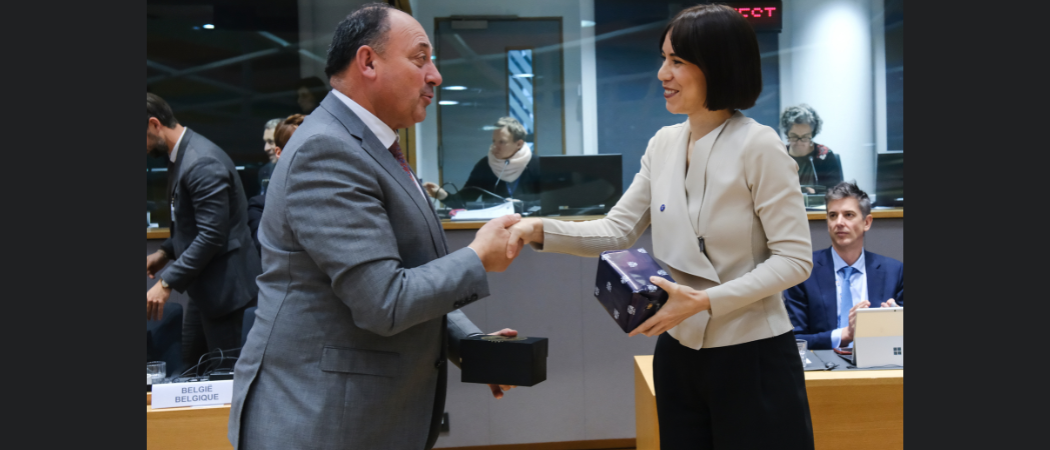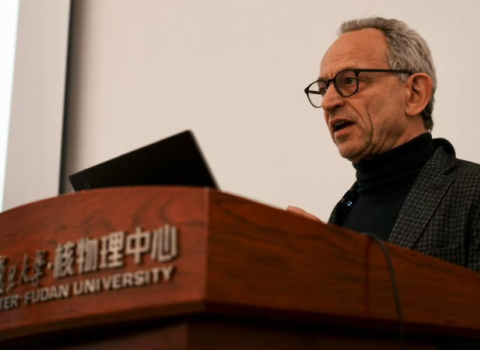As things wind down to the dissolution of the European Parliament and elections next June, Belgium has put translation and commercialisation of research results and international cooperation on the agenda for a presidency focussed on technology sovereignty

Willy Borsus, research and innovation minister of Belgium’s Walloon Government (Left), exchanges gifts with Spanish science minister Diana Morant Ripoll as Spain passes over the presidency of the Council to Belgium. Photo: European Union
Technology sovereignty, international cooperation and translation of research to market are on the menu, for Belgium’s tail-end presidency of the EU from January to June next year, as the clock ticks down to the June 6 – 9 elections.
For research policy, the next six months will centre on using research and innovation to help the EU achieve its strategic goals, from the green transition, to digitalisation, to health.
International cooperation will play a key role in the process, a move welcomed by research stakeholders.
“These themes require deeper reflection and hopefully dialogue with the research community, since at the same time openness and increased collaborative efforts to address global challenges exist as parallel policy objectives for the EU and its framework programmes,” says Sarika Wilson, head of policy at the Guild of European Research-Intensive Universities.
The research community is ready to talk. For Mattias Björnmalm, secretary general of the university association CESAER, the biggest need right now is allocating “sufficient resources and clear support structures for identifying and mitigating potential risks.”
The goal is to ensure that research, with its dependence on global cooperation, is not sacrificed in the name of Europe-first strategic autonomy. Finding the right balance entails eye-level conversations between researchers and governments, Björnmalm notes, in a nod to the new presidency.
Lidia Borrell-Damián, secretary general of Science Europe, hopes to engage the member states with perspectives from other parts of the world, including Africa, Latin America and the Caribbean. To spearhead global collaboration, leaders and policy makers from outside Europe repeatedly say joint programmes must be co-designed to better fit everyone’s needs, not just the Europeans, Borrell-Damián says. “It is all part of these multiple delicate balances you have to achieve in global strategic autonomy.”
When it comes to issues such as open science and data, “we have to have compatible and comparable policy frameworks. These are all necessary issues to address that are linked to research and are essential to ensure a positive environment for collaboration.”
Innovation capacity
The presidency’s Council conclusions, which will bring together perspectives from all EU member states on a joint issue, will focus on improving the translation and commercialisation of research results.
The conclusions will aim to set out principles for tailoring research results to societal needs and Europe’s reindustrialisation. Continuing efforts to reduce the innovation capacity gaps between different EU regions are likely to feature.
Stephane Berghmans, director of research and innovation at the European University Association, says the conclusions will play a key role in guiding the implementation of the New European Innovation Agenda, a strategy to boost Europe’s innovation potential presented last year.
These conclusions are expected be adopted by EU research ministers in the formal Competitiveness Council meeting on 23 May.
Other discussions the Belgians hope to take forward include enhancing trust and engagement with science, with the help of evidence-informed policymaking and science communication. Science Europe will host a presidency event on this topic in spring.
Berghmans says this is key at a time when governments contemplate cutting research funding. “Indeed, strengthening trust in science and societal engagement is very important, especially in the context of decreasing political backing for research and innovation public investments,” he said.
And as the European Commission prepares to draft a proposal for the next EU research framework FP10, due to start in 2027, the member states will take the opportunity to learn from the evaluation of the previous seven-year framework, Horizon 2020. The goal will be to “identify opportunities to maximise the economic, scientific and societal impact of this programme, as well as the EU-added value.
Wilson says this is an important opportunity “to analyse the achievements of the programme and what can be learned for the preparation of FP10.”
Research ministers will also give attention to nuclear research, with a focus on high-level radioactive waste and nuclear material testing. Here, they will stress the importance of the international nuclear fusion project ITER, which has recently been plagued by delays and management issues.
Beyond research policy
On the health policy front, meanwhile, the Belgians hope to finalise the EU Health Data Space (EHDS) deal, which will provide an important resource for research, but acknowledge they don’t expect a breakthrough on the contentious pharmaceutical legislation package, saying only that they will continue to progress negotiations.
Industry, the European Parliament and the member states have been struggling to find common ground on the reform of the EU’s pharmaceutical legislation, because they can’t agree how to stimulate innovation and investment in the sector, whilst guaranteeing drug supplies and ensuring equitable access to medicines across the EU.
While also outside of the remit of science ministers, the research community is likely to be following negotiations on the EU’s green manufacturing industry strategy and the Net-Zero Industry Act, among other Green Deal policy actions. The negotiations start this week and are expected to conclude in February.
Here, pointing to the Belgian presidency’s industrial ambitions, Björnmalm says it’s key to highlight the contribution of research and innovation to the process to ensure money needed for research does not get siphoned to industrial policy.
“Instead of diverting resources towards any subsidy schemes, we should seek to substantially reinforce key instruments playing to strengths of the continent, such as Horizon Europe. This is the best departure point for developments in this area,” says Björnmalm.





 A unique international forum for public research organisations and companies to connect their external engagement with strategic interests around their R&D system.
A unique international forum for public research organisations and companies to connect their external engagement with strategic interests around their R&D system.